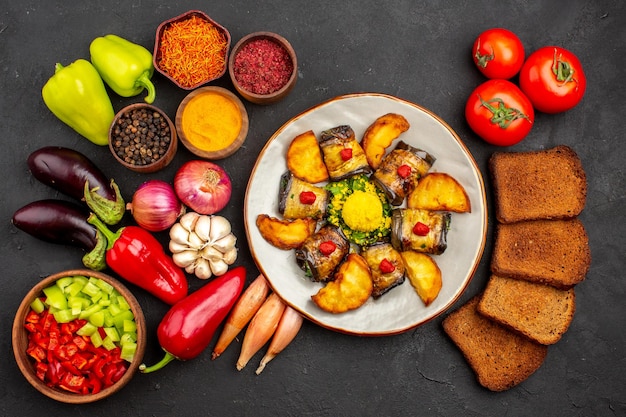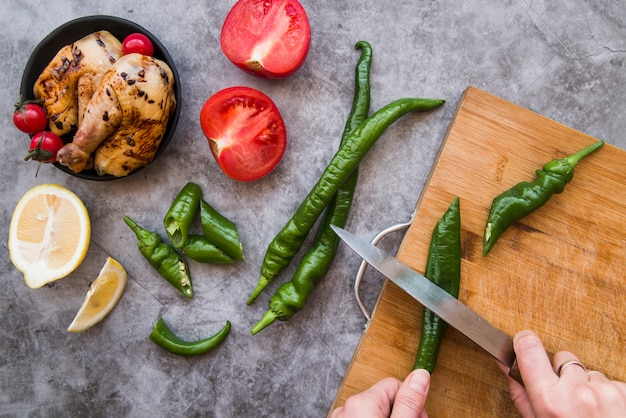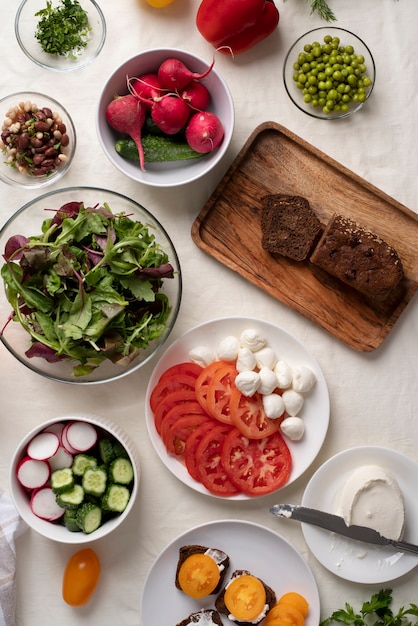What is the healthiest oil to roast vegetables?
Roasting vegetables is a popular cooking technique that brings out their natural flavors and creates a delicious and nutritious side dish or main course. However, choosing the right oil to roast your vegetables in can be a bit confusing, especially with the wide variety of oils available in the market. In this article, we will explore the healthiest oil options for roasting vegetables and why they are beneficial for your overall well-being.
The importance of using the right oil
Using the right oil for roasting vegetables not only enhances the taste but also contributes to the healthiness of the dish. Oils contain different types of fats, and some are healthier than others. The composition of fats in an oil affects its nutritional value, flavor, smoke point, and stability during the cooking process.
Smoke point and stability
When roasting vegetables, it’s crucial to consider the smoke point of the oil you use. The smoke point is the temperature at which an oil begins to smoke, break down, and produce harmful compounds. Using an oil with a low smoke point can result in a burnt or unpleasant taste, as well as the release of potentially harmful substances.
The healthiest oil choices for roasting vegetables
Extra virgin olive oil is widely regarded as one of the healthiest oils for roasting vegetables. Rich in monounsaturated fats, vitamin E, and antioxidants, it offers numerous health benefits. Extra virgin olive oil also has a relatively high smoke point, making it suitable for roasting at moderate to high temperatures.
Avocado oil is another excellent option for roasting vegetables. With a mild taste and a high smoke point, avocado oil provides a good source of monounsaturated fats and essential nutrients. It is also known for its ability to enhance absorption of fat-soluble vitamins from vegetables.
“Using extra virgin olive oil or avocado oil for roasting vegetables not only adds flavor but also provides a wide range of health benefits.”
Comparing different oils for roasting vegetables
To help you make an informed decision, here is a comparison table showcasing the nutritional properties and smoke points of some commonly used oils for roasting vegetables:
| Oil | Smoke Point | Nutritional Properties |
|---|---|---|
| Extra Virgin Olive Oil | Up to 410°F (210°C) | High in monounsaturated fats, antioxidants, and vitamin E |
| Avocado Oil | Up to 520°F (270°C) | Rich in monounsaturated fats, vitamins, and minerals |
| Coconut Oil | Up to 350°F (177°C) | Contains medium-chain fatty acids and lauric acid |
| Grapeseed Oil | Up to 420°F (216°C) | High smoke point, neutral flavor |
Can you roast veg with extra virgin olive oil?
Roasting vegetables is a delicious way to bring out their natural flavors and create a crispy texture. While many recipes recommend using vegetable oil or other cooking oils for roasting, you might be wondering if you can use extra virgin olive oil instead. The good news is that yes, you can absolutely roast vegetables with extra virgin olive oil, and it can even enhance their taste.
The benefits of using extra virgin olive oil for roasting vegetables
Extra virgin olive oil (EVOO) is not only a healthier alternative to many other cooking oils, but it also adds a unique depth of flavor to your roasted vegetables. It contains beneficial antioxidants and monounsaturated fats that can help reduce inflammation and improve heart health.
When roasted at a moderate temperature, EVOO can add a rich, nutty taste to your vegetables. The high smoke point of extra virgin olive oil makes it suitable for roasting at higher temperatures without burning or smoking too quickly.
Tips for roasting vegetables with extra virgin olive oil
Here are some tips to ensure your roasted vegetables turn out perfectly:
- Preheat your oven to the desired temperature, usually around 400°F (200°C).
- Choose a baking sheet or roasting pan large enough to hold all your vegetables in a single layer.
- Wash and chop your vegetables into uniform sizes for even cooking.
- Toss the vegetables with extra virgin olive oil, coating them evenly. You can use your hands or a brush to ensure every piece is well coated.
- Add your favorite herbs, spices, or seasonings to enhance the flavor.
- Spread the vegetables in a single layer on the baking sheet, making sure they aren’t overcrowded.
- Roast in the preheated oven until the vegetables are tender and golden brown, usually between 20-30 minutes, depending on the vegetable and desired level of doneness.
Remember to keep an eye on your vegetables while roasting to prevent them from burning.
“Roasting vegetables with extra virgin olive oil adds a delightful flavor and can be a healthier choice.”
Why do chefs use olive oil instead of vegetable oil?
Olive oil is a staple ingredient in Mediterranean cuisine and has gained popularity worldwide due to its numerous health benefits and versatile flavor profile. Chefs, especially those trained in Mediterranean or European cooking, often prefer using olive oil over vegetable oil for several reasons.
Taste and Flavor
Olive oil offers a distinct taste that enhances the flavor of dishes. It adds a fruity, peppery, or grassy note depending on the variety and region it comes from. The unique flavor profile of olive oil can elevate both simple and complex dishes, making it a preferred choice among chefs.
Health Benefits
One of the main reasons chefs prefer olive oil is its health benefits. Olive oil is rich in monounsaturated fats which can help lower bad cholesterol levels and reduce the risk of heart disease. It also contains antioxidants, such as vitamin E, which have anti-inflammatory properties.
Higher Smoke Point
Compared to vegetable oil, olive oil has a higher smoke point, which is the temperature at which an oil begins to smoke and disintegrate, creating unpleasant flavors and potentially harmful compounds. This makes olive oil suitable for a wide range of cooking methods including sautéing, frying, and roasting.
Versatility in Cooking
Olive oil’s versatility in cooking makes it a preferred choice for chefs. It can be used for everything from salad dressings and marinades to baking and grilling. Olive oil also pairs well with a variety of ingredients and enhances the overall taste of the dish.
“Olive oil not only adds depth of flavor to dishes but also provides health benefits, making it a key ingredient in my kitchen.” – Chef John Smith
To illustrate the differences between olive oil and vegetable oil, here is a comparison table:
| Criteria | Olive Oil | Vegetable Oil |
|---|---|---|
| Taste | Fruity, peppery, grassy | Mild, neutral |
| Smoke Point | Higher | Lower |
| Health Benefits | Rich in monounsaturated fats, antioxidants | Varies depending on the type of vegetable oil |
| Versatility | Wide range of culinary applications | Varies depending on the type of vegetable oil |
In conclusion, chefs prefer olive oil over vegetable oil due to its distinct taste, health benefits, higher smoke point, and versatility in cooking. Incorporating olive oil into your culinary repertoire can not only add flavor to your dishes but also contribute to a healthier lifestyle.
What oil do you use to roast vegetables?
Roasted vegetables are an excellent side dish or even a main course, packed with flavor and nutrients. But have you ever wondered what type of oil is best to use when roasting your veggies? The oil you choose can greatly impact the taste and texture of your roasted vegetables, so it’s essential to make the right choice. Here are some options to consider:
Olive Oil
Olive oil is a popular choice for roasting vegetables in the UK. Its rich, fruity flavor adds depth to the vegetables, making them more delicious. Additionally, olive oil contains heart-healthy monounsaturated fats, making it a healthier choice compared to other oils.
Vegetable Oil
Vegetable oil is a versatile option for roasting vegetables. It has a neutral flavor, allowing the natural flavors of the vegetables to shine through. This oil also has a high smoke point, making it suitable for high-temperature roasting without burning.
Coconut Oil
Coconut oil is a unique choice for roasting vegetables, imparting a subtle coconut flavor. It works particularly well with sweet vegetables like butternut squash or sweet potatoes. Keep in mind that coconut oil solidifies at room temperature, so warm it up if necessary before using.
“The oil you choose can greatly impact the taste and texture of your roasted vegetables.”
Remember that the choice of oil depends on personal preference and the type of vegetable you are roasting. Some vegetables, like potatoes, carrots, and onions, tend to go well with most oils, while others may benefit from specific flavors. To help you decide, here’s a table outlining the best oil options for different vegetables:
| Vegetable | Recommended Oil |
|---|---|
| Potatoes | Olive oil, vegetable oil, or sunflower oil |
| Carrots | Olive oil, vegetable oil, or coconut oil |
| Broccoli | Olive oil or vegetable oil |
| Cauliflower | Olive oil or vegetable oil |
| Brussels Sprouts | Olive oil or vegetable oil |
Remember to coat your vegetables evenly with the oil of your choice, along with any desired seasonings, before roasting. A light drizzle or brush is usually sufficient to prevent them from becoming overly greasy. Enjoy experimenting with different oils to discover which ones enhance your favorite roasted vegetables!
Can you roast vegetables with sunflower oil?
Roasting vegetables is a popular and delicious way to prepare them, but when it comes to choosing the right cooking oil, many people wonder if sunflower oil can be used. The good news is that yes, you can certainly roast vegetables with sunflower oil!
Benefits of using sunflower oil for roasting vegetables
Sunflower oil is a versatile cooking oil that has several benefits when it comes to roasting vegetables. Firstly, it has a high smoke point, which means it can withstand higher temperatures without breaking down and releasing harmful compounds.
In addition to its high smoke point, sunflower oil has a neutral flavor that won’t overpower the natural taste of the vegetables. This makes it perfect for roasting, as it allows the flavors of the vegetables to shine through.
How to roast vegetables with sunflower oil
Roasting vegetables with sunflower oil is a simple process. Start by preheating your oven to the desired temperature (typically around 200°C). Then, chop your vegetables into even-sized pieces and place them on a baking sheet.
In a small bowl, combine sunflower oil, salt, pepper, and any desired herbs or spices. Toss the vegetables in the oil mixture until they are well coated. Spread the vegetables out in a single layer on the baking sheet, ensuring they have enough space to cook evenly.
Roasting time can vary depending on the type and size of the vegetables, but generally, you’ll want to roast them for about 20-30 minutes or until they are golden brown and tender.
“Roasting vegetables with sunflower oil can result in crispy, flavorful, and healthy dishes.”
How Much Olive Oil Should You Use When Roasting Vegetables?
Roasting vegetables is a delicious and healthy way to enjoy a variety of flavors. One ingredient that is often used in vegetable roasting is olive oil, which adds a rich taste and helps to enhance the natural flavors of the vegetables. However, it’s important to use the right amount of olive oil to avoid making your dish too greasy or unhealthy.
The Importance of Using the Right Amount
Using just the right amount of olive oil ensures that your roasted vegetables have a perfect balance of flavor and texture. Using too much oil can lead to greasy vegetables that lose their crispiness, while using too little may result in dry and unappetizing vegetables.
When it comes to roasting vegetables, less is more,” says renowned chef Jamie Oliver. “You only need enough oil to lightly coat the veggies.”
Determining the Right Amount
So, how do you determine the right amount of olive oil to use when roasting vegetables? A general guideline is to use about 1-2 tablespoons of oil per pound of vegetables. However, the exact amount may vary depending on personal preference and the specific vegetables you’re roasting.
If you prefer your roasted vegetables to be crispy and have a slightly caramelized exterior, use the lower end of the oil quantity spectrum. On the other hand, if you prefer a softer texture and richer flavor, you can opt for a slightly higher amount of olive oil.
Tips for Even Distribution
To ensure even distribution of the olive oil, it’s best to toss the vegetables in a large mixing bowl with the oil and any desired seasonings before spreading them out on a baking sheet. This technique helps to ensure that each piece of vegetable is evenly coated, resulting in consistent cooking and flavor throughout.
Pro tip: Use your hands or a pair of kitchen tongs to gently toss the vegetables with the oil. This way, you can ensure that every nook and cranny of the vegetables is coated in the right amount of olive oil.
Conclusion
In summary, sunflower oil is a great choice for roasting vegetables. Its high smoke point and neutral flavor make it ideal for achieving crispy and flavorful results. So go ahead and try roasting your favorite vegetables with sunflower oil next time – you won’t be disappointed!
When it comes to roasting vegetables, using the right amount of olive oil is crucial for achieving optimal flavor and texture. Remember that moderation is key, and it’s always better to start with a little less oil and add more if needed. By following these guidelines, you’ll be able to create mouthwatering roasted vegetables that are healthy and full of flavor!



